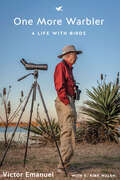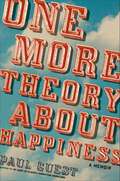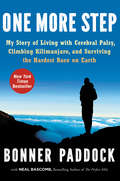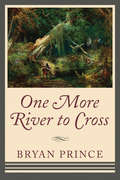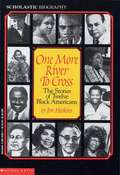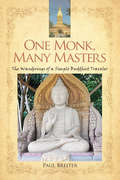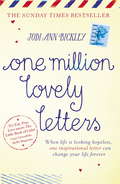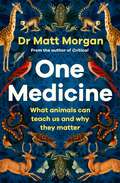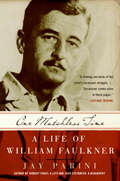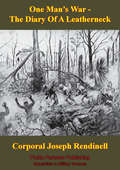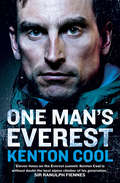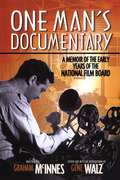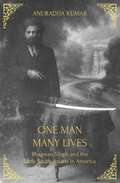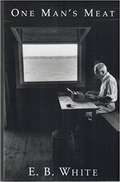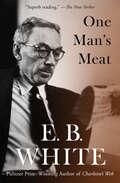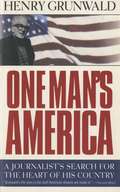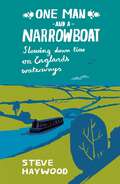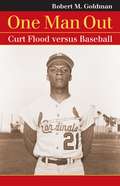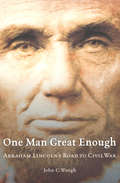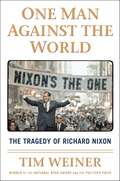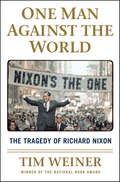- Table View
- List View
One More Warbler: A Life with Birds
by Victor Emanuel S Kirk WalshOne of America’s foremost birders recounts his birding adventures as well as his friendships with numerous luminaries.Victor Emanuel is widely considered one of America’s leading birders. He has observed more than six thousand species during travels that have taken him to every continent. He founded the largest company in the world specializing in birding tours and one of the most respected ones in ecotourism. Emanuel has received some of birding’s highest honors, including the Roger Tory Peterson Award from the American Birding Association and the Arthur A. Allen Award from the Cornell Laboratory of Ornithology. He also started the first birding camps for young people, which he considers one of his greatest achievements.In One More Warbler, Emanuel recalls a lifetime of birding adventures—from his childhood sighting of a male Cardinal that ignited his passion for birds to a once-in-a-lifetime journey to Asia to observe all eight species of cranes of that continent. He tells fascinating stories of meeting his mentors who taught him about birds, nature, and conservation, and later, his close circle of friends—Ted Parker, Peter Matthiessen, George Plimpton, Roger Tory Peterson, and others—who he frequently birded and traveled with around the world. Emanuel writes about the sighting of an Eskimo Curlew, thought to be extinct, on Galveston Island; setting an all-time national record during the annual Audubon Christmas Bird Count; attempting to see the Imperial Woodpecker in northwestern Mexico; and birding on the far-flung island of Attu on the Aleutian chain. Over the years, Emanuel became a dedicated mentor himself, teaching hundreds of young people the joys and enrichment of birding. “Birds changed my life,” says Emanuel, and his stories make clear how a deep connection to the natural world can change everyone’s life.“Whether he is recounting his experiences with raptors in Turkey, rose-ringed parakeets in India, or black-and-white owls in Panama, Emanuel’s love of the natural world is always on display. A charming narrative for avid birders and armchair nature lovers, sure to inspire at least a few flights of fancy.” —Kirkus Reviews“Victor Emanuel is a remarkable man who found his mentors in birding and went on to become a leader in that community for the past fifty years. In One More Warbler, Victor shares his wide-ranging adventures across the globe, including the story of his enormously influential ecotourism company, and the reasons why he become a mentor himself to whole generations of young ornithologists. It’s a fascinating read.” —Kenn Kaufman, author of Kingbird Highway“This book is classic Victor: a tapestry of anecdotes, adventures, philosophical musings, and tributes to people, all woven together by glowing words of admiration for the rich diversity of birds that grace our lives, and define his.” —John Fitzpatrick, Director, Cornell Lab of Ornithology
One More Time: A Memoir
by Carol BurnettThe child of two alcoholic parents, Burnett presents a sometimes hilarious, sometimes heartbreaking coming-of-age: from her sadly hopeful mother, who was hooked on Tinseltown fantasy, to the first signs of her own comic gift; from happy weekends spent with her father, to their last tragic meeting in a public sanatorium. The book is an intimate, touching, and astonishing narrative of a financially desperate but emotionally rich childhood on the wrong side of Hollywood's tracks.
One More Theory About Happiness: A Memoir
by Paul Guest“In these lyrical, searing pages, Guest manages to break our hearts and put them back together again.”—Ann HoodIn the tradition of Lucy Grealy’s Autobiography of a Face, One More Theory About Happiness is a bold and original memoir from the acclaimed, Whiting Award-winning poet Paul Guest, author of My Index of Horrifying Knowledge. A remarkable account of the accident that left him a quadriplegic, and his struggle to find independence, love, and a life on his own terms, One More Theory About Happiness has been praised by Charles Bock, author of Beautiful Children, as, “Smart and honest and clear eyed and above all, humane.”
One More Step
by Neal Bascomb Bonner PaddockIn 2008, Bonner Paddock summited 19,341-foot-high mount kilimanjaro, the world's tallest freestanding mountain. Four years later, he earned the elite triathlete title kona Ironman. Thousands have done each individually. Bonner is the first person with cerebral palsy to do both.Bonner Paddock grew up just wanting to be ordinary. Despite his skinny legs and habit of tripping over nothing, he fought to keep up with his athletic older brothers, learned to battle riptides with his grandfather on close watch, and did everything he could to feel like a regular kid, even when it became clear he wasn't. After being diagnosed with cerebral palsy at age eleven, Bonner didn't let it limit him--instead he simply ignored its existence. For the next eighteen years, he guarded the truth about his health, building a normal life and keeping his secret from everyone--most of all himself.But the sudden death of a friend's young son named Jake, a boy who also suffered from cerebral palsy, forced Bonner to reevaluate who he was. No longer content striving for normal, he began to pursue one breathtaking experience after another in Jake's memory, never hiding from his physical limitations and, in the process, raising international awareness about cerebral palsy. T is appetite for challenges led him to the foothills of Mount Kilimanjaro where, pushing his fragile body to the brink and barely surviving, he braved one mountain only to discover that he still had farther to climb.Embracing his weaknesses to understand his strengths, he then pursued the ultimate adventure: testing his mind, body, and will at the Ironman in Kona, Hawaii, a race regarded by many as the hardest on earth. Along the way he forged a renewed bond with his family and launched a foundation to help disabled children in Africa and at home.In the end, his remarkable journey took him across the globe and introduced him to a compelling cast of characters--from Tanzanian mountain guides to top-class surgeons, to disabled children, to champion athletes--all of whom inspired his quest. Infused with his irresistible charisma, courage, and heart, and illustrated with sixteen pages of color photos, One More Step is a gripping story of human perseverance that demonstrates how our lives are not defined by limits, but by the moments and lessons that push us past them.
One More River to Cross
by Bryan PrinceThis is the story of Isaac Brown, a slave who was accused of the attempted murder of a plantation owner in Maryland, escaped, and ultimately made his way to freedom in Canada. In the early to mid-nineteenth century, Isaac Brown, a slave, was accused of the attempted murder of a prominent plantation owner, despite there being no evidence of his guilt. Brown, after enduring two brutal floggings, was shipped to a New Orleans slave pen. From there the resourceful Brown was able to make a daring escape to Philadelphia in the free state of Pennsylvania. His biggest error was writing a note informing his free wife and eleven children in Maryland of his whereabouts. The note was intercepted and led to his arrest and attempted extradition back to Maryland.While engaged in researching an ancestor named Isaac Brown, Bryan Prince encountered the very high-profile case of what turned out to be a different Isaac Brown. The story of this slave, with its culmination in Brown’s dramatic escape and ultimate success in crossing the border into Canada, is the riveting subject of historian Bryan Prince’s latest book.
One More River To Cross: The Stories Of Twelve Black Americans
by Jim HaskinsPresents brief biographies of twelve African Americans who courageously fought against racism to become leaders in their fields, including Marian Anderson, Ralph Bunche, Fannie Lou Hamer, and Malcolm X.
One Monk, Many Masters: The Wanderings of a Simple Buddhist Traveler
by Paul BreiterIn 1969, Paul Breiter was among the throngs of disaffected youth who traveled to the exotic East, seeking to escape the cultural and spiritual upheavals at home. He traveled first to India, thinking that indulging the senses would be his means of finding God. Instead, he found himself at a monastery in Thailand, taking the precepts of a Buddhist monk. He would spend the next seven years in robes, not indulging the senses, but depriving them. One Monk, Many Masters: The Wanderings of a Simple Buddhist Traveler is an account of Breiter’s life as a monk and his ongoing search for enlightenment after leaving the monastic robes. Breiter’s spiritual wanderings weave through the Theravada, Zen, and Tibetan Buddhist traditions under such great teachers as Ajahn Chah, Ajahn Sumedho, Kobun Chino, Lama Gonpo, and the 16th Karmapa.
One Million Lovely Letters: When life is looking hopeless, one inspirational letter can change your life forever
by Jodi Ann BickleyOne Million Lovely Letters is one woman's inspirational journey to recovery. A witty and uplifting testament to the power of words to heal the heart and mind. As featured on 'Jodi's Lovely Letters', part of the popular BBC One series 'Our Lives'. In the summer of 2011, aged only 22, Jodi Ann Bickley contracted a serious brain infection that would change her life forever. Jodi had been performing at Camp Bestival on the Isle of Wight. Returning with pockets full of glitter, she thought the happy memories would last forever. A week later, writhing in pain on the doctor's surgery floor, Jodi found out that she had been bitten by a tick and contracted a serious brain infection.Learning to write and walk again was just the start of the battle. In the months that followed Jodi struggled with the ups and downs of her health and the impact it had on her loved ones. Some days Jodi found herself wondering whether she could go on. She had two choices: either to give up now or do something meaningful with the time she had been given. Jodi chose the latter. This is the story how she turned her life around.'An extraordinary woman.' Stephen Fry'There is so much emotion in these pages that we challenge you not to cry.' Cosmopolitan'It's a fantastic book, from a fantastic wordsmith, and I'm so proud of how much Jodi has achieved since I've known her. Proper chuffed. Ed x' Ed Sheeran www.onemillionlovelyletters.com http://www.youtube.com/watch?v=QXxglvEMUQc
One Million Lovely Letters: When life is looking hopeless, one inspirational letter can change your life forever
by Jodi Ann BickleyOne Million Lovely Letters is one woman's inspirational journey to recovery. A witty and uplifting testament to the power of words to heal the heart and mind. As featured on 'Jodi's Lovely Letters', part of the popular BBC One series 'Our Lives'. In the summer of 2011, aged only 22, Jodi Ann Bickley contracted a serious brain infection that would change her life forever. Jodi had been performing at Camp Bestival on the Isle of Wight. Returning with pockets full of glitter, she thought the happy memories would last forever. A week later, writhing in pain on the doctor's surgery floor, Jodi found out that she had been bitten by a tick and contracted a serious brain infection.Learning to write and walk again was just the start of the battle. In the months that followed Jodi struggled with the ups and downs of her health and the impact it had on her loved ones. Some days Jodi found herself wondering whether she could go on. She had two choices: either to give up now or do something meaningful with the time she had been given. Jodi chose the latter. This is the story how she turned her life around.'An extraordinary woman.' Stephen Fry'There is so much emotion in these pages that we challenge you not to cry.' Cosmopolitan'It's a fantastic book, from a fantastic wordsmith, and I'm so proud of how much Jodi has achieved since I've known her. Proper chuffed. Ed x' Ed Sheeran www.onemillionlovelyletters.com http://www.youtube.com/watch?v=QXxglvEMUQc
One Medicine: How understanding animals can save our lives
by Dr Matt MorganIt all started with a Hob Nob. As Dr Matt Morgan, an intensive care consultant, examined a patient who had suffered a cardiac arrest after inhaling some biscuit crumbs, he saw a flock of birds fly past the window. They must inhale objects all the time when flying, how do they survive? he thought to himself. This began an investigation that spanned continents, species and millennia. For animal science has so much to teach us about human medicine. While some of the overlaps and parallels are obvious – we know how much DNA we share with primates, the first pig heart has been transplanted into a human – there is so much more that we have learnt from the animal world. For example, studying kangaroos, in particular the female&’s three vaginas, has improved in-vitro fertilisation success rates. Watching how a giraffe breathes can help save the life of someone struggling with asthma. Investigating why birds that live in the frozen Arctic circle don&’t freeze to death led to advances with treating hypothermia. Getting a ECG on the 150kg heart of a humpback whale was instrumental to keeping patients with cardiac failure living longer. We owe animals so much, it&’s time to focus on examining how they live and what we still have to learn from them. Better shared understanding of how our species coexists with millions of others can lead to untold medical advances, help both humans and animals and improve the world for all creatures from single-celled bacteria to a 30,000 kg whale. Who knows, maybe a kiss from a frog will save your life?
One Matchless Time: A Life of William Faulkner
by Jay PariniBiography and literary analysis of William Faulkner.
One Matchless Time: A Life of William Faulkner
by Jay PariniWilliam Faulkner was a literary genius, and one of America's most important and influential writers. Drawing on previously unavailable sources -- including letters, memoirs, and interviews with Faulkner's daughter and lovers -- Jay Parini has crafted a biography that delves into the mystery of this gifted and troubled writer. His Faulkner is an extremely talented, obsessive artist plagued by alcoholism and a bad marriage who somehow transcends his limitations. Parini weaves the tragedies and triumphs of Faulkner's life in with his novels, serving up a biography that's as engaging as it is insightful.
One Man’s War — The Diary Of A Leatherneck
by George Pattullo Corporal Joseph E. Rendinell"Joe (Corporal Rendinell) at the outbreak of the War was working in the steel mills as an electrician. He joined up with the 6th Marines, and - fought with his regiment through the battle of Belleau Woods. He was wounded and gassed three times, rejoined his regiment and was discharged at the end of the war with three citations for bravery."Here is the war seen through the eyes of the average young American soldier, disciplined and toughened by it, both physically and spiritually. When it came to rough stuff he could hold his own with anybody. He had none of the edifying traits of the bedtime story hero. With him war was a desperate "knock down and drag out" business, the mighty crushing drama of stem reality."His diary, ungrammatical, illiterate, with spelling often incorrect, has in its simplicity a majesty and dramatic range that is remarkable. Says George Pattullo, "The Corporal has put a whole war into fewer words than a correspondent employs to tell how clever he was in getting up to the front.""He describes with vivid simplicity the battle of Belleau Woods, in which he was a member of an advance scouting party. He dismisses mention of his being wounded in half a dozen words, but words which are loaded impressively with feeling and strength."His diary is the personal touch applied to history, and withal it has a robust, healthy, frank humour."
One Man’s Everest: The Autobiography of Kenton Cool
by Kenton CoolKenton Cool is the finest alpine climber of this generation. His accomplishments are staggering. He has summited Everest twelve times. He is the first person in history to climb the three Everest peaks, the so-called Triple Crown, in one climb, a feat previously thought impossible. He was nominated for the prestigious piolet d'Or in 2004 for climbing a previously unclimbed route on Annapurna III. In 2012 he fulfilled the Olympic Games pledge of placing a 1924 gold medal on the Everest summit. He is the only Briton to have skied down two 8000-metre mountains, and in 2009 he guided Sir Ranulph Fiennes to the summit of Everest, helping to raise over £3 million for Marie Curie Cancer Care.His accomplishments are all the more extraordinary considering an incident in the summer of 1996 which tore Kenton's world apart. Whilst climbing in Wales, he broke a handhold on a route aptly called 'Major Headstress' and fell to the ground with such force that he shattered both his heel bones. Initially told he would never walk unaided again, Kenton spent four weeks in hospital, had three operations, three and a half months in a wheelchair and months of rehab. Today he is still in pain and after a long day in the mountains it's not uncommon to see him struggling to walk or moving around on his hands and knees. Yet he still climbs.'Why do you do it?' people ask him. This book tells why.
One Man’s Documentary: A Memoir of the Early Years of the National Film Board
by Graham McInnesGraham McInnes was one of many talented young people recruited by the charismatic John Grierson to build the National Film Board of Canada during the heady days of WWII. McInnes’s memoir of these “days of high excitement” is an insider’s look at the NFB from 1939 to 1945, a vivid “origin” story of Canada’s emerging world-class film studio that provides the NFB with the kind of full-bodied vitality usually associated with the great Hollywood studios in their golden years.An art critic and CBC radio commentator when he joined the NFB in 1939 as a scriptwriter, McInnes worked on many film classics with filmmakers such as Tom Daly, Norman McLaren, Gudrun Parker, and Budge Crawley. McInnes portrays these legends as well as many other players in that dynamic world, such as Lorne Green, Morley Callaghan, and Mavis Gallant, in this stylish, witty, and affectionate recreation of the early day-to-day frenzy.One Man’s Documentary is a lively account of one of the most exciting periods in Canadian filmmaking. With style and verve, McInnes paints vivid portraits of Grierson and the others who helped make the NFB an international institution. Film historian Gene Walz’s introduction gives a full picture of the early history of the NFB as well as an account of McInnes’s fascinating life.
One Man, Many Lives: Bhagwan Singh and the Early South Asians in America
by Anuradha KumarTwo men, near-identical names, and their intertwined lives. On one side is Bhagwan Singh, an itinerant religious preacher, a rebel on the run, poet, writer, and even a self-help guru. On the other is Bhogwan Singh, turban-wrapper, occasional actor, and one of the first Indians in Hollywood. When one appears on historical records, the other goes off the radar. This is a story of their journeys, intersecting, meshed, and melded mysteriously with each other.Anuradha Kumar plays armchair detective as she courses through books, newspapers, pamphlets and films to uncover the trajectories of these two lives and the times they inhabited. As much as it is about Bhagwan and Bhogwan Singh, this book tells the larger and more remarkable story of how the first South Asians adapted, adjusted and remade themselves to a life in the New World.
One Man's Meat
by E. B. WhiteCollection of essays on the author's personal life written for The New Yorker Harper's Magazine.
One Man's Meat
by E. B. WhiteThe Pulitzer Prize–winning writer and author of Charlotte&’s Web documents his move from Manhattan to a saltwater farm in New England: &“Superb reading.&” —The New Yorker Called &“a mid-20th–century Thoreau&” by Notre Dame Magazine, E. B. White&’s desire to live a simple life caused him to sell half his worldly goods, give up his job writing the New Yorker&’s &“Notes and Comment&” editorial page, and move with his family to a saltwater farm in North Brooklin, Maine. There, White got into the nuts-and-bolts of rural life—not without a lot of self-reflection—and surrounded himself with barnyard characters, some of whom would later appear in Charlotte&’s Web.One Man&’s Meat is White&’s collection of pithy and unpretentious essays on such topics as living with hay fever (&“I understand so well the incomparable itch of eye and nose for which the only relief is to write to the President of the United States&”), World War II (&“I stayed on the barn, steadily laying shingles, all during the days when Mr. Chamberlain, M. Daladier, the Duce, and the Führer were arranging their horse trade&”), and even dog training (&“Being the owner of dachshunds, to me a book on dog discipline becomes a volume of inspired humor&”). Though first published in 1942, this book delivers timeless lessons on the value of living close to nature in our quest for self-discovery. With each subject broached and reflected upon, it &“becomes an ardent and sobering guidebook for those of us trying to live our day-to-day lives now&” (Pif magazine). &“The most succinct, graceful and witty of essayists.&” —San Francisco Examiner and Chronicle &“A lively record of an active inquiring mind.&” —Kirkus Reviews
One Man's America: A Journalist's Search for the Heart of His Country
by Henry GrunwaldA wise, witty, and humane autobiography filled with a passionate curiosity about the people--and meaning--of America. One Man's America is at once a stirring account of a young immigrant becoming an American, a personal history of the major milestones of the late twentieth century, a fascinating insider's view of the most widely read news magazine in the world, and a warm and loving family saga. Here also is the remarkable success story of a boy driven from his native Vienna by the Nazis and returning years later as an ambassador; of a copy boy who rose to become editor of Time magazine. During his long and distinguished career in journalism, Grunwald knew, befriended, and feuded with some of the greatest figures on the world stage, from Whitaker Chambers and Marilyn Monroe to John F. Kennedy and Henry Kissinger to Ronald Reagan and Fidel Castro. But the immense power his position allowed him was tempered by a fierce desire to know everything he could about the mores and folkways of the whole United States, Main Street bankers and student radicals alike, through whom he sought to understand the heart of his adopted country. One Man's America is, above all, a hymn to the ever-turbulent, ever-changing land of America.
One Man and a Narrowboat: Slowing Down Time on England’s Waterways
by Steve HaywoodInspired by Tom Holt, who took to the canals on a journey immortalised in the book 'Narrow Boat', Steve sets out from Oxford to explore what makes the English… well, so English! Prepare for a generous helping of mayhem, mishaps and the staple of every English summer: torrential rain.
One Man and a Narrowboat: Slowing Down Time on England’s Waterways
by Steve HaywoodInspired by Tom Holt, who took to the canals on a journey immortalised in the book 'Narrow Boat', Steve sets out from Oxford to explore what makes the English… well, so English! Prepare for a generous helping of mayhem, mishaps and the staple of every English summer: torrential rain.
One Man Out: Curt Flood vs Baseball
by Robert M. GoldmanWhen Curt Flood, all-star center fielder for the St. Louis Cardinals, refused to be traded to the Philadelphia Phillies in 1968, he sent shock waves throughout professional baseball that ultimately reached the Supreme Court.
One Man Great Enough: Abraham Lincoln's Road to Civil War
by John C. WaughThe award-winning historian John C.Waugh takes us on Lincoln's road to the CivilWar. From Lincoln's first public rejection of slavery to his secret arrival in the capital, from his stunning debates with Stephen Douglas to his more contemplative moments,Waugh shows us America as Lincoln saw it and as Lincoln described it.Much of this wonderful story is told by Lincoln himself, detailing through his own writing his emergence onto the political scene and the evolution of his beliefs about the Union, the Constitution, democracy, slavery, and the buildup to the CivilWar. In this acclaimed biography,Waugh brings us ever closer to understanding this mysterious, complicated, and truly great man.
One Man Against the World: The Tragedy of Richard Nixon
by Tim WeinerTHE RIVETING STORY OF A DRAMATIC AND DISASTROUS PRESIDENCY Here is the first history of President Richard Nixon with all of his secret tapes and documents, many declassified in the past two years. Pulitzer Prize and National Book Award winner Tim Weiner presents a devastating portrait of a tortured and tormented man. In gripping prose, the author shows how, in Nixon's mind, the conflict in Vietnam and the crimes of Watergate were one war, fought on two fronts. A brilliant politician, Nixon rose by force of will from a crowded shack in rural California to the White House. But, as president, Nixon trusted no one--not his Cabinet, not his closest advisers, not the American people. Elected to unite a nation as discordant as it was at the close of the Civil War, Nixon disdained domestic policies and programs. He wanted above all to create what he called "a generation of peace"--by asking the world's leading Communist dictators to help him end the Vietnam War. Nixon saw antiwar American citizens as opponents no less dangerous than the enemy in Vietnam. He fought his foes without mercy. Abroad, his best weapons were B-52 bombers. One Man Against the World lets the reader listen in as Nixon, gripped by rage and insomnia, calls down death and destruction. At home, Nixon used undercover agents, warrantless wiretaps, break-ins, and burglaries as tools of intelligence gathering against Democratic Party leaders and the antiwar legions. His henchmen--including his attorney general and his closest White House advisers--went to prison for their crimes. Almost all his presidency is recorded on tape or preserved on paper. Together these materials create a remarkable record of the most intimate and damning conversations between the president and his confidants. Only recently, after forty years of struggle, has much of this jaw-dropping information been made public. One Man Against the World is a work of new insight into Richard Nixon--a man who saw enemies everywhere and, standing alone, took up arms against them. Nixon saw himself not only as the leader of the free world but "the world leader." Yet he was addicted to the gutter politics that ruined him. His political suicide has no equal in American history. That was his tragedy to bear."
One Man Against the World: The Tragedy of Richard Nixon
by Tim WeinerThe National Book Award–winning author of Legacy of Ashes delivers “a devastating account of Nixon’s presidency . . . powerful [and] extraordinary” (Publishers Weekly, starred review).Drawing on newly declassified documents, One Man Against the World paints a devastating portrait of a tortured yet brilliant man who led the country largely according to a deep-seated insecurity and distrust of not only his cabinet and congress, but the American population at large. In riveting prose, Tim Weiner illuminates how the Vietnam War and the Watergate controversy that brought about Nixon’s demise were inextricably linked.From the hail of garbage and curses that awaited Nixon upon his arrival at the White House, to the unprecedented action Nixon took against American citizens, to the infamous break-in and the tapes that bear remarkable record of the most intimate and damning conversations between the president and his confidantes, Weiner narrates the history of Nixon’s anguished presidency in fascinating and fresh detail.A crucial new look at the greatest political suicide in history, One Man Against the World leaves us not only with new insight into this tumultuous period, but also into the motivations and demons of an American president who saw enemies everywhere, and, thinking the world was against him, undermined the foundations of the country he had hoped to lead.
